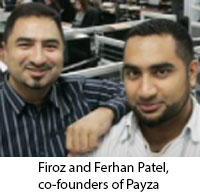Payza’s Firoz Patel hid $24 mill, pleads guilty to obstruction
 After pleading guilty to money laundering charges, Firoz Patel’s plan seems to have been do a bit of jail time and then live off $24 million in stashed bitcoin.
After pleading guilty to money laundering charges, Firoz Patel’s plan seems to have been do a bit of jail time and then live off $24 million in stashed bitcoin.
Unfortunately for Patel the DOJ caught wind of the stash, prompting additional criminal charges filed in May 2023.
Patel pled guilty to obstruction last month and now faces a second prison sentence.
 Firoz Patel and brother Ferhan Patel ran the AlertPay, Payza and EgoPay payment processors back in the day.
Firoz Patel and brother Ferhan Patel ran the AlertPay, Payza and EgoPay payment processors back in the day.
In addition to servicing clients engaged in terrorist financing, narcotics trafficking, identity theft, and child pornography, AlertPay, Payza and EgoPay served as a hub for MLM related financial fraud.
One notable example is Zeek Rewards, for whom Payza laundered over $100 million in stolen investor funds.
The Rex Venture Group (a/k/a Zeek Rewards) offers the primary example of Payza being used to launder Ponzi scheme proceeds.
Law enforcement learned that for the vast majority of 2012, Payza’s primary transaction activity related to a single user, Paul Burks, the individual who ran the Rex Venture Ponzi scheme.
The records reflect at least $100,000,000 in transactions conducted from and to Burks’ Payza account.
Emails among Payza employees obtained via search warrants revealed that Payza attempted to encourage the Rex Venture Group to relocate operations outside of the United States shortly before it was shut down by the SEC.
Paul Burks was sentenced to fourteen years in prison in 2017.
Criminal charges were filed against the Patel brothers in 2018. Through AlertPay, Payza and EgoPay, the DOJ alleged the Patel brothers ran a $250 million plus money laundering empire.
After a brief stint on the run, during which Firoz mocked the DOJ for going after him, Firoz agreed to surrender in January 2019.
Firoz would go on to plead guilty in July 2020. He was sentenced to three years in prison in November 2020.
Ferhan Patel was sentenced to eighteen months and was released on July 22nd, 2022.
Between sentencing and reporting to the Bureau of Prisons to commence his sentence, and unbeknownst to the DOJ at the time, Firoz stashed 450 bitcoin in a staking account held with Blockchain.com.

As per a supporting memorandum filed on April 25th, 2023 (also quoted from above in relation to Zeek Rewards), Firoz opened a Blockchain.com account using the same Belize company tied to Solitaire Holdings.
Solitaire Holdings was a shell company that served as the parent company for MH PIllars, a UK shell company that served as the parent company for Payza.
A Payza employee stated that Firoz Patel owned a lot of companies in other people’s names, such as Ferhan Patel, and other friends and family members.
This employee knew of at least 30 companies that Firoz Patel had created and owned in furtherance of the conspiracy.
The employee stated that Firoz Patel’s name being attached to the companies was causing him problems.
As a result, Firoz Patel would create companies and place them in someone else’s name but would still have a “blind trust” behind them so that he still exercised full control.
The employee stated that at times Firoz Patel would ask him/her to falsify corporate documents and that Firoz Patel kept changing the directors of companies based on what he wanted.
The employee stated that Firoz Patel eventually became frustrated with him/her when he/she refused to comply with Patel’s request to alter corporate documents, to include documents that would be used in legal proceedings.
The employee ultimately left Payza, fearful of Firoz Patel.
The DOJ learned of Patel’s deposit with Blockchain.com in July 2021, after the newly created account Firoz used was flagged and frozen for potential fraud.
On July 2, 2021, HSI DC learned that on April 27, 2021 (one month prior to Firoz Patel’s self-surrender date), Firoz Patel deposited 450 BTC (valued at $24,020,699.83 USD on that date), into an interest earning account at Blockchain.com.
That bitcoin is suspected to be proceeds of Payza’s prior illicit activities – as described below.
The bitcoin was ultimately frozen by Blockchain.com due to the account holder’s suspected ties to Payza and the inability of the account holder to provide adequate KYC information.
The restraint was accomplished by transferring the bitcoin to a separate wallet.
Firoz had created the account under the name “Musa Patel”, that of his father.
When the Blockchain.com account was opened, the phone number provided for the account owner was 514-991-[redacted], and the email provided for the owner was [redacted] (Email Account 1), as the identifiers.
Note that the phone number and email address above are not redacted in the memorandum filing. I’ve redacted the information so as to not trigger spam bots.
During the course of the investigation into Payza, it was discovered that both this phone number and Email Account 1 were known to be associated with Firoz Patel, and not Musa Patel.
The person who opened this Blockchain.com account also provided an address of 35 Barrack Road, 2nd Floor, Belize City, Belize.
This address was used by Firoz Patel to incorporate at least six different shell companies while operating Payza, to include Ecommerce Worldwide d/b/a Egopay, that was used to provide services to Payza’s highest risk clients, many of which were criminal enterprises such as Ponzi schemes.
Information obtained from Blockchain.com reflects that on April 30, 2021, Blockchain.com sent an email to Email Account 1 requesting further information for the purpose of obtaining additional KYC information due to irregularities with the account information provided at opening and the high value of the deposit.
One such irregularity was the fact that the account holder provided an address in Belize yet the IP address (IP ADDRESS 1) that was obtained by Blockchain.com during the transaction indicated they were actually located in Canada.
In that email, Blockchain.com asked for the full legal name of the account holder.
Despite the fact that the account was opened in the name of “Musa Patel” using Firoz Patel’s email address, phone number, and a business address associated with Payza, the response provided to Blockchain.com was purported to be from an individual named “Vineet Tewari” on April 30, 2021 using Email Account 1.
 In various still accessible marketing material tied to Payza, Vineet Tewari is cited as a Director of Payza’s Indian operations.
In various still accessible marketing material tied to Payza, Vineet Tewari is cited as a Director of Payza’s Indian operations.
However, payment information obtained from Google indicates the owner of Email Account 1 is actually Firoz Patel.
Furthermore, during the course of the investigation into Payza, it was discovered that an individual named Vineet Tewari was an employee of Payza’s branch in India called Crescent Payments Private Limited, which is the d/b/a name for Crescent Business Solutions Private Limited.
The occupation provided to Blockchain.com for Tewari was the Director of Crescent Business Solutions Private Limited.
Based on this information, I submit that there is a direct link between Tewari and Payza’s business operations.
The use of Tewari to further perpetuate the fraud upon Blockchain.com is consistent with Firoz Patel’s prior use of Payza employees to open businesses and take actions to violate the law, and specifically in this case. to conceal his money laundering activities.
The email from Blockchain.com to Email Account 1 also asked who Musa Patel was and why this name was used at account opening.
Tewari, using Email Account 1 responded, “[t]his was the name of the person who setup the account in first place. There was no way to change the name before I took over to my name for verification.”
Blockchain.com also asked for additional information to explain the possession of the bitcoin.
The explanation provided was, “[t]he crypto currency was transferred from my friend’s account, also at Blockchain.com who has loaned me the BTC to earn extra with.
The BTC was purchased in years before (2015-2016) and was sitting in his Blockchain account for a few years, before it was then transferred to Binance to trade with, and then the extra brought back to Blockchain.”
Blockchain.com determined this explanation did not make any sense and did not adequately explain the origin of the bitcoin.
This was one of the reasons cited by Blockchain.com as to why they ultimately decided to restrain the bitcoin.
Between April 30, 2021 and June 4, 2021, correspondence continued regarding the bitcoin between Blockchain.com and Email Account 1.
As noted above, Firoz Patel self-surrendered to a Bureau of Prisons facility on June 11, 2021. Records obtained from Google show Email Account 1 was accessed at least 93 times during this time period.
A majority of the logins to Email Account 1 were done via computer and had an IP address that comes back to a location in Quebec, Canada (where Firoz Patel lived prior to his self-surrender).
This IP address (IP ADDRESS 1) was also the same one from which the Blockchain.com interest account was opened.
As noted below, IP ADDRESS 1 was also used to access Firoz’s Patel’s account at a known cryptocurrency wallet services provider (Exchanger 1) 155 times between December 6, 2021, and April 26, 2021.
The DOJ would go on to conclude that Patel Firoz had opened the Blockchain.com account and controlled it. Not his father or Vineet Tewari.
Blockchain.com seized Firoz’s staking account under UK law.
After receiving responses that made no sense to their inquiries, Blockchain.com restrained the bitcoin in question and as required by the applicable laws of the United Kingdom, disclosed the matter to the relevant authority there.
On June 23, 2021, Firoz Patel filed a claim in a Court in the United Kingdom against Blockchain Access UK seeking the return of the 450 BTC.
Neither Musa Patel nor Vineet Tewari have filed claims seeking the return of the bitcoin.
The DOJ was able to recover Firoz’s stashed bitcoin pursuant to a seizure warrant granted in January 2022.
As previously noted Patel pled guilty to one count of Obstruction of an Official Proceeding on September 17th, 2024.
The offense carries a maximum 20 years prison sentence and/or fine of $250,000 or twice the pecuniary gain or loss of the offense.
Agreed upon sentencing guidelines add addition severity to the base offense level score (14):
- +3 for “substantial interference with administration of justice”
- +2 for “otherwise extensive in scope, planning, or preperation”
- -2 for Patel demonstrating “acceptance of responsibility”
This brings Firoz’s Estimated Offense Level score to 17. Firoz’s past conviction for money laundering is also a factor.
From Firoz’s plea agreement;
Based upon the Estimated Offense Level and the Estimated Criminal History Category set forth above, your client’s estimated Sentencing Guidelines range is 27 months to 33 months.
In addition … should the court impose a fine, at Guidelines level 17, the estimated applicable fine range is $10,000 to $95,000.
I’m not entirely sure how that fine amount was reached given the amount Firoz stashed at the time was $24 million. Perhaps recovery of the bitcoin and/or Firoz pleading guilty factors in.
In any event, Firoz is scheduled to be sentenced on January 22nd, 2025.
Update 23rd January 2025 – At the request of Firoz Patel’s attorney, Patel’s sentencing has been rescheduled for February 6th, 2025.
Update 7th February 2025 – Firoz Patel was sentenced to another 41 months in prison on February 6th. 2025.


Article updated to note Firoz Patel’s sentencing has been rescheduled for Feb 2025.